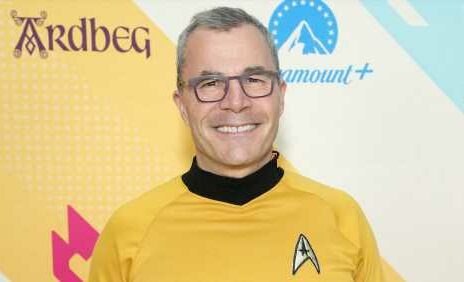Chuck Lorre had a lot on his mind earlier this year as his four active CBS comedy series — “Young Sheldon,” “Bob Hearts Abishola,” “B Positive” and “The United States of Al” — wound down production for the 2021- 22 season. In the end, Team Lorre went 2-2, as CBS pulled the plug on “B Positive” and “Al” but re-upped “Abishola.” “Young Sheldon” had already nabbed a three-season renewal last year.
At this stage of his career, Lorre doesn’t worry too much about his box scores. He doesn’t count the number of shows on his roster, nor the number of cameras used in production. What he does focus on more than ever is what he wants to say with the shows that come from the small army of loyalists who drive Chuck Lorre Prods. More than ever, he eschews high concept and favors the human comedy.
“When I grew up, a situation comedy was, an astronaut comes home with a genie in a bottle. That’s a situation, right? Wait — I married a witch. That’s a situation. But a family is a family. It’s not heightened and there’s no end to the material because it’s just life, you know?”
Starting with the launch of “Mom” in 2013, the CBS comedy about a blue-collar mother and daughter who were both recovering addicts, Lorre has demonstrably veered into more socially conscious territory with his network series. He also expanded into the arena of single-camera comedies with “Young Sheldon” and Netflix’s Emmy-nominated “The Kominsky Method,” which wrapped its three-season run last year.

Here, the comedy titan reflects on the collaborative process of crafting TV and how his interests as a writer and producer have evolved as his 70th birthday approaches in October. And Lorre drops the surprise that he’s recently been rewatching episodes of a show in his canon that brought him both riches and a painful public battle.
Dying is easy, comedy is hard. In this fraught cultural moment, how do you go about making people laugh?
My philosophy has always been, you have to care about the characters before you laugh. Caring allows you to love them even if you don’t like them if the character is sort of an antagonistic type of character. Anybody’s going to tell you their favorite character on “Taxi” was Danny DeVito. You know, he was basically playing the devil. He was this horrible, caustic character (as dispatch chief Louie De Palma) but you loved him. I rewatched a bunch of “Taxi” during the pandemic, and I just thought, my God, what a singular performance that was from Danny DeVito. … So basically, before you embark on creating a show or writing a pilot, you have to be honest with yourself about what are the chances that you’re going to care about these people as a viewer, and I count myself as a viewer as well as a writer. I want to care.
Is it intimidating to work in an environment where the country is so politically divided and charged and virtually every viewer has a megaphone on social media to comment on your work?
It’s absolutely intimidating, because the fallout if you misstep is horrific. I don’t come to Burbank and say, “Let’s offend people today. Let’s fill them with loathing for us as human beings.” No, I don’t want to do that. The shows we’re doing are about what pulls people together: raising children, making a life in this country, navigating old age. Those are not partisan issues. There’s no cancel culture involved in being worried about your kid or trying to keep a marriage together. We all share those universal human elements. And if we focus on that, I am hopeful that we can avoid the anger — because there’s so much anger.
What’s it been like to produce your multicamera shows without a studio audience for months now?
We haven’t had a live studio audience in almost two years. … Despite it being considered something of a mongrel genre, working in front of a live audience, every week, is the greatest training in the world. Because when, no matter how smart and funny and wonderfully talented you might think you are, if 200-some odd people are sitting up there and if they don’t laugh … you know, you’ve been to enough tapings that sometimes you can hear the 134 freeway when you’re supposed to hear laughs. So, you’re scurrying. It’s humbling, it’s frightening. It’s embarrassing. It hurts. It viscerally hurts when stuff dies. But it breeds a sense of humility. You can’t go around thinking you’re that smart when 30% of a script dies in front of a live studio audience. I am so grateful that that is how I came up — with the unbelievable stress of putting on a new show every week for a live studio audience.
With all that training, what was it like to shift gears into streaming with something as personal to you as “Kominsky Method”?
With “Kominsky,” I very much wanted to tell a story over what amounts to four or five hours. And I wanted to do something without a room full of writers — something I wrote. I brought guys in to help me punch it up. Without any doubt, you bring in great comedy writers, and have them look at a script, they’re gonna see things you don’t see. … I’m ashamed to have to say this because it’s such a well-known thing to people in the film world, but you’re writing with visual images instead of words. And you can construct all kinds of things that you would never have dreamed of. In the four-camera world, the page is everything. But when you move into the world of film, there’s a whole other language that comes into play. It was new to me, and I love it. It changed the way we do the four-camera shows.

After so many years and so many shows, you still seem to love the game.
I love that the body of work is sustainable. I didn’t set out to make Kleenex. We all set out to make silk hankies that you can wash and use again. And I love that, every once in a while, I will watch a “Two and a Half Men” rerun when Angus [T. Jones] was really little, and there was stuff I’d completely forgotten.
Charlie Sheen left “Two and a Half Men” amid a storm of controversy in 2011 that included him taking many public shots at you. Does that history color your feelings about the show overall?
It is really gratifying that what we made still works on some level. Time has passed and the episodes with Charlie are a joy to watch. There were a couple of years there where I couldn’t watch it. It was too hurtful. I can enjoy them all now. You know, he did a brilliant job. And the chemistry between him and [co-stars] Jon [Cryer] and Angus and Holland Taylor and, oh my goodness, Conchata Ferrell, who has passed away. It was a beautiful cast.
What is the most misunderstood part of producing television, particularly at the volume that your shop handles?
Making these shows is very much a communal activity. I’m making four shows? Not a chance. That just can’t happen. That’s a recipe for failure. Because it’s just too hard. It’s too hard to do one show every week unless you surround yourself with smart people.
Source: Read Full Article


